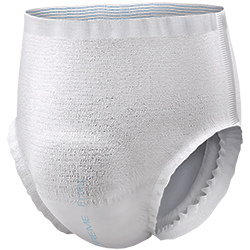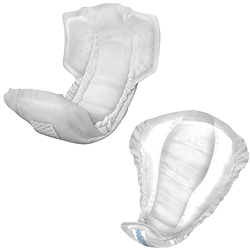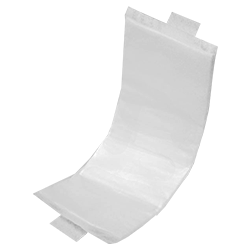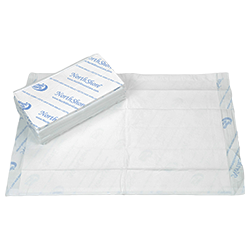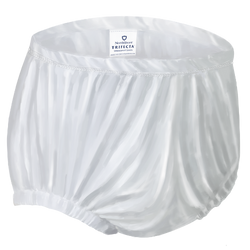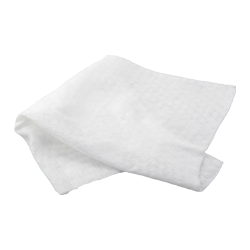What Are the Causes of Incontinence?

Incontinence can happen to just about anyone, regardless of age, gender or lifestyle. It is challenging to deal with, but understanding why it happens can help you find solutions for yourself or someone you care for. We will take a closer look at incontinence causes and how they can affect different people.
What Causes Urinary Incontinence?
Urinary incontinence occurs when someone loses bladder control. They may empty their bladder or experience a small leak. Many different factors can cause urinary incontinence. Specific activities might trigger it, like sneezing, coughing and exercising, or it might occur with a strong, sudden urge to urinate without enough time to reach a toilet.
Urinary incontinence might come from:
-
Weakened or damaged bladder or pelvic floor muscles.
-
Overactive bladder muscles.
-
An enlarged prostate.
-
Neurological conditions like dementia and Alzheimer's.
-
Infections, such as urinary tract infections (UTIs) and bladder infections.
-
Diseases that make it hard to reach the bathroom in time, such as arthritis.
Incontinence can occur alongside conditions like diabetes, menopause, prostate or bladder cancer, obesity and pregnancy or childbirth. If you believe urinary incontinence is caused by a medical problem or physical condition, you will want to speak with a doctor immediately.
Below are some other possible causes of urinary incontinence and the conditions that lead to it.
Aging
Our muscles tend to weaken as we age, and the urinary system is no exception. When these muscles lose definition, urinary incontinence can occur. Estimates say that over 70% of nursing home residents experience urinary incontinence. Although it is a common problem for older adults, it is not "just a part of getting older" and should still be addressed.
Enlargement and Blockage
When structures near the bladder become enlarged or inflamed, incontinence can occur. Some examples include:
-
Prostate enlargement: The prostate sits at the neck of the bladder and tends to enlarge with age. When this happens, men commonly experience incontinence due to the blockage of the bladder.
-
Pregnancy: During pregnancy, the baby's weight can press on the bladder and cause incontinence.
-
Constipation: With constipation, the enlarged colon places pressure on the bladder, which can worsen incontinence.
-
Kidney stones: Kidney stones pass from the kidney to the bladder through small tubes that can become blocked. Blocked urine can make it feel like the need to urinate more urgently and more often.
-
Cancer: Prostate and bladder cancer can both lead to incontinence, along with some of their treatments. Tumors can also block the flow of urine.
Damage
Different types of damage to the body can also cause incontinence, such as muscle damage that makes it hard to go to the bathroom or nerve damage that affects brain signaling. One of the more common types of damage resulting in incontinence is pregnancy, which often affects the pelvic floor muscles. Spinal cord injuries and surgeries in the area can also affect the urinary system.
Pregnancy
The extra pressure from the baby pressing on the bladder can make pregnant women need to urinate more often with greater urgency. The process of childbirth can also affect the pelvic muscles, causing injury or prolapse that leads to incontinence. Women who have given birth see higher risks of incontinence than women who have not had a baby.
Menopause
When estrogen levels drop, the lining of the urethra thins out and pelvic muscles can weaken. Combined with the weakened muscles already associated with aging, menopause is a common time for women to experience incontinence.
Stress
Stress is another factor. Much like many medical conditions, stress plays a major role in how the body works — or does not. The higher the stress, the more the body starts to shut down. Over time, this can cause more problems with incontinence.
Nutrition
Other causes of urinary incontinence include diet, physical activity and even alcohol consumption. What happens is that some foods work as a diuretic, increasing urine production and resulting in more trips to the bathroom. Too much consumption of these products can lead to incontinence. Below is a list of foods that can act as a diuretic:
-
Caffeine
-
Chili peppers
-
Carbonated drinks
-
Too much vitamin C
-
Sugar
-
High acid foods
Infections
UTIs can cause cystitis, or an inflammation of the bladder. It may result in pain and worsen sudden urges to urinate, potentially causing incontinence.
What Causes Bowel Incontinence?
Bowel leakage, or fecal incontinence, tends to be caused more by medical and physical conditions rather than diet. Constipation, diarrhea and nerve damage are all common causes of bowel issues.
Bowel incontinence can also be the symptom of much larger problems such as the muscles in the intestines not working properly, not having the mental ability to recognize signs of needing to go, and the rectum not providing sufficient warning before an accident occurs. If you have fecal incontinence, see a doctor immediately, or encourage a loved one to do so if they experience it.
Typical bowel control depends on pelvic muscles, the rectum and anal sphincter muscles, as well as the nerves that send signals to the brain that it is time to go. If these areas are damaged or working improperly, the individual can experience bowel incontinence. Like urinary incontinence, women and older adults more commonly deal with bowel constipation.
The following factors are some common causes of fecal incontinence.
Constipation and Fecal Impaction
Chronic constipation can cause hard stool to get stuck in the rectum in fecal impaction. The hard stool can stretch the sphincter and weaken it so it can no longer prevent normal stool from leaving the body. It may cause nerve damage. Watery stool can also move around the impacted stool and leak out.
Nerve Damage
Nerve damage affecting the sphincter muscles can also cause incontinence. When this happens, the sphincter cannot close properly and may not signal to the brain that it is time to go to the restroom. This kind of nerve damage can come from many sources, like a stroke, childbirth, spinal cord injury, consistent straining during bowel movements or diabetes.
Muscle Damage
Anal sphincter damage can keep the muscles from working properly and can come from situations like surgery, childbirth or constipation.
Diarrhea
Loose stool is harder to keep in, so diarrhea can cause or worsen incontinence.
Surgery
Surgery in the area can cause muscle or nerve damage resulting in fecal incontinence.
Hemorrhoids
If external hemorrhoids block the sphincter and prevent it from closing, loose stool and mucus can move through. As mentioned above, surgery for hemorrhoids can also cause problems.
Pelvic Floor Dysfunction
Like urinary incontinence, poor pelvic floor functioning can cause bowel incontinence. Pregnant women often experience pelvic floor dysfunction, but it may not be immediately present. If the muscles involved in bowel movements become weak, they may not work correctly. Other issues that can affect the pelvic floor include rectal prolapse and rectocele. These conditions occur when the rectum protrudes into the anus or the vagina.
What Causes Incontinence Among Older Adults & the Elderly?
Both fecal and urinary leakage are often seen (but are not mutually exclusive) among people as they age. There are several reasons why we see incontinence more often in the elderly.
Muscle Weakness
As we age, some of the bladder's muscle fibers get replaced with a stiffer type of tissue. It is less capable of performing different functions, like forcefully contracting or constricting. In men, the prostate also tends to enlarge with age, and it can block the flow of urine out of the bladder.
Changes in Neurological Signaling
Aging also affects the way our bodies send signals about needing to urinate or pass stool. Older adults may not feel the need to urinate until the bladder is fuller than it would be in a younger person. They may also need to urinate more frequently and experience nighttime urination or nocturia.
One reason this happens is that the muscles that trigger warning signs and help prevent accidents are weaker, so they are less able to recognize or prevent an accident from occurring.
Another reason older adults tend to experience incontinence more often is that their bodies have experienced more wear and tear from their diets. Years of caffeine, carbonated drinks and spicy foods have taken a toll, making it harder to control bladders and bowels.
Other Medical Issues
The last reason a person might experience incontinence is they do not recognize the need to go. This could be due to deteriorating mental ability that does not allow them to understand the urge. When someone does not realize they need to go, accidents may occur more easily.
Older populations tend to see higher numbers of certain diseases and conditions that affect one's ability to get to the bathroom. This situation could be due to cognitive decline, medication side effects, limited mobility or something else. The acronym "DIAPPERS" can even help identify treatable causes of incontinence in older adults:
-
Delirium: Delirium creates a sudden change in alertness and thinking and can keep someone from reaching a toilet.
-
Infection: An infection, such as a UTI, could cause increased frequency and urgency, along with pain and confusion leading to incontinence.
-
Atrophic urethritis and vaginitis: Lower estrogen levels in older women can cause urinary and genital tissues to thin and result in incontinence.
-
Pharmaceuticals: Older people often take more medications, many of which have side effects related to incontinence.
-
Psychological disorders: Issues like depression and delirium can prevent someone from getting to the bathroom.
-
Excessive urine output: Increased output can come from conditions like high blood sugar or heart failure.
-
Restricted mobility: Many older adults deal with limited mobility from issues like arthritis or Parkinson's that prevents them from reaching the bathroom in time.
-
Stool impaction: If the bowel is full of stool, it can restrict the bladder and prevent it from releasing urine. This causes a dribbling type of incontinence.
Is Incontinence Different for Women and Men?
Both urinary and fecal incontinence look similar between men and women. Both experience a lack of control in preventing accidents. However, there are a few differences between genders. For instance, it might be harder to assess the problem with men because their prostates can play a role in an overactive bladder.
Another difference is more women have incontinence problems than men. This is especially true with women who have had a child.
What Are the Symptoms of Incontinence?
Now that you know the causes of incontinence among different groups of people, the next question is, what are the symptoms? Knowing what to look out for is the first step in living life leak-free, worry-free and dry. Symptoms include:
-
Unable to control urination and/or bowel movements.
-
Leaks whenever coughing, laughing or sneezing.
-
Wetting the bed.
-
Frequent trips to the bathroom.
If you or a loved one are experiencing any of these symptoms, speak to a doctor immediately.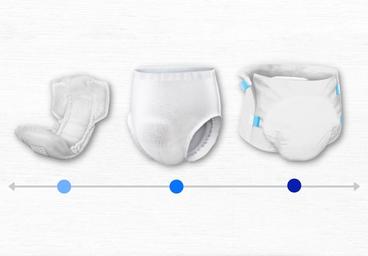
Where Can I Find Incontinence Products?
You are going to need a few products if you or someone you care for is managing incontinence. That's where NorthShore can help. We offer a wide array of incontinence supplies.
Many people start with liners and pads or incontinence pull-ons. They can provide a discreet fit under clothes and offer the absorbency needed to prevent embarrassing leak spots on pants and clothing.
There are also waterproof bed pads for overnight protection. They can be placed on top of mattresses and sheets to keep them dry and can be used to help protect furniture.

